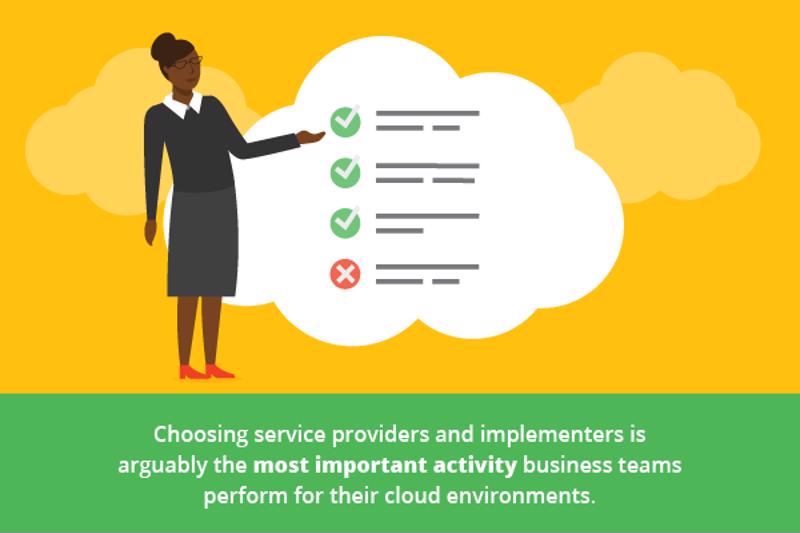Integrating cloud computing services into your organization requires buy-in from different parties who frequently have divergent interests. For example, C-level executives as well as managers may be keen to shift IT infrastructure to Amazon Web Services or Microsoft Azure to trim capital expenditures and better support company growth. However, their IT departments might balk at this ensuing loss of direct control over essential resources, along with their own reduced roles in shaping organization-wide policies and technological initiatives.
The sometimes conflicting positions of IT and business personnel can further complicate the implementation of already-complex hybrid projects blending public and private aspects, which account for most of current cloud projects. A 2017 report by 451 Research revealed that 69 percent of enterprises would work within multi-environment clouds by 2019, but that they were facing new challenges in navigating the complexities of rapidly evolving cloud technologies.
There’s no doubt that optimizing cloud-based applications and infrastructures for multifaceted operations – such as supply chain management (SCM) – inevitably requires significant collaboration between IT and business, despite their clear differences. In this two-part series, we’ll examine the roles of each side, starting with business, to explore how they can be brought together for consistent project success.
How line-of-business teams shape today’s cloud environments
Corporate management is often in the driver’s seat in evaluating and selecting key technologies, including cloud. According to a 2015 report from BPI Network and Dimension Data, nearly half (47 percent) of senior managers were spending more time than ever considering the strategic implications of new hardware and software, with another 38 percent saying they were hoping to do so.
Many also think their IT departments are falling behind the curve in driving company innovation. CEOs, vice presidents et al. usually perceive cloud as the appropriate solution, i.e., a fresh approach that will improve the agility and responsiveness of their entire organizations, not just provide a technical upgrade over older equipment.
Accordingly, business personnel set the requirements for what kinds of results cloud platforms must deliver. For example, say the leadership team at a manufacturer was contemplating a cloud transformation for improved SCM. It might focus on issues such as:
- Streamlining inventory management.
- Integrating data sources for superior forecasting and replenishment.
- Supplementing or replacing legacy systems.
- Reducing costs stemming from IT problems such as downtime and poor visibility.
Cloud is a means to an end in all of these cases. Whether a given SaaS or IaaS solution has certain technical specifications matters less to business-side decision-making than its track record in modernizing SCM, not to mention its level of support from the relevant vendors and partners.

Finding the right cloud collaborators: An essential task for management
In fact, choosing service providers and implementers is arguably the most important activity business teams perform for their cloud environments. The technical complexity of cloud architectures and the numerous available options for any given use case raise the stakes for finding the right fit in terms of cost, performance, security and compliance.
The IT department is usually well-equipped to offer helpful guidance on these matters, and we’ll look at its role in more depth in the second half of this series. At the same time, proven partners like Inspirage can help navigate the many decisions necessary during a transition to cloud computing. Whether you’re upgrading SCM practices, extending ERP systems into the cloud or implementing specific software such as Oracle Transportation Management, Inspirage is here to make your cloud journey as easy as possible. Visit our Resources Center or contact us directly for more information.
